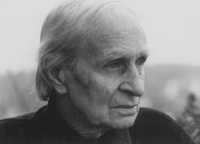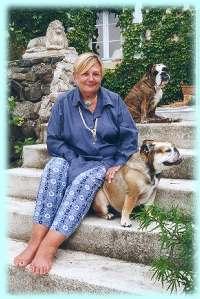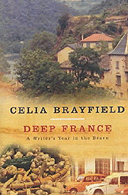Ovaries, autographs, infidelity & kippers
In today's blog
Denis Dutton on Bovary's ovaries
A letter from Laurens van der Post
The value of famous people's letters
A disillusioning biography of VSP
Chatto's "apparent prostitution"
Kipper-bonding with Anita Burgh
Denis Dutton on Bovary's ovaries
The first thing to catch my eye online last Monday morning was a review of Madame Bovary's Ovaries: a Darwinian Look at Literature by David P. Barash and Nanelle R. Barash.The reviewer is Denis Dutton of Arts & Letters Daily fame, whose photograph you see on the left. On an elegantly simple web page, he writes -

Likewise, discriminating human females are central to the world of Jane Austen, whom the Barashes call "the poet laureate of female choice." Selecting a good mate is Austen's major theme. She is particularly adept at bringing out, against the vast intricacies of a social milieu, the basic values women seek in men, and men tend to want in women (shortlist: good looks, health, money, status, IQ, courage, dependability and a pleasant personality - in many different weightings and orderings). Not being a peacock, Mr. Darcy does not have iridescent feathers, but for human females his commanding personality, solid income, intelligence, generosity, and the magnificent Pemberley estate do very nicely.
I disagree with some of the "basic values" Professor Dutton lists. In my observation and experience, looks, money and status have little to do with happy marriages. There are only two essential qualities to look for in a mate [using the word in its old-fashioned sense] : kindness and a sense of humour. Everything else is a bonus.
A letter from Laurens van der Post
Browsing my bookshelves this week, I took down a Reprint Society copy of Venture to the Interior by Laurens van der Post.
The book's first owner was someone called Margaret Brennan who wrote her name on the flyleaf. I bought it for three shillings in a second hand bookshop, but so long ago that I can't remember where. Tucked among the pages was a folded 30-years-old letter from the author.

27 Chelsea Towers, Chelsea Manor Gardens, SW3 18 December 1975
Dear Miss Weale Thank you very much for your letter and the honour you do me. I would of course love to come but my problem is that the date, October 19th, falls in a time of the year when I could easily be summoned out to Africa and because of that usually have to keep that month fairly free. I could only accept on the condition that if I am forced to return to my native country somewhat unexpectedly and have to cancel the engagement you would all understand.
I realise that this sort of provisional acceptance makes planning extremely difficult and I shall completely understand if it is not definite enough for you. But in my sort of life this is the only way I can say yes to long-term engagements.
Please remember me most warmly to Jean Goodman and to my many friends in your association. Yours sincerely L van der Post
The association he referred to was East Anglian Writers which, in the Sixties and Seventies, arranged for leading authors to speak at literary luncheons at the Royal Hotel, Norwich. You may remember I wrote about this organisation in the 8 May 2005 blog, under the heading Professor Sir Malcolm Bradbury. [See archive in right hand column]
Do other bookworms store press clippings, letters etc in their books? I imagine many of us do. I must see what else I can find.
Letters from famous people
Perhaps if the letter from Laurens van der Post had been hand-written rather than typed it would have been of interest to collectors. Curious to find out the value of letters from the famous, I discovered an interesting article Letters for sale by Manohar Malgonkar. Writing about E M Forster, Mr Malgonkar had this to say -
But the value of even hand-written letters differed sharply, as I was to discover when, years later, I showed my own three Forster letters to buyers in London. Mine were worth only about fifty-pounds apiece, I was told. Because, when he wrote them, late in his life, Forster's reputation , at any rate, the value of the letters he wrote in his twilight years, had taken a dive.
Apparently in 1970 a man called John Morris who had been a lifelong friend of Forster's had turned down an offer of eight thousand pounds from an American University for the letters Forster had written to him over the years and which he had preserved. However it was Morris's intention to leave the letters in his will to the Forster papers at King's College Cambridge.
I''ll pursue this subject in a future blog.
On being disillusioned about V S Pritchett
I wish I hadn't borrowed Professor Jeremy Treglown's biography, V S Pritchett : A Working Life [Chatto & Windus £25] from the Guille-Allès public library.
All my life, Pritchett has been described as a master of the short story. He was President of the English branch of PEN [Poets, Essayists and Novelists] and of the Society Authors. On the front cover blurb, I read -
This dazzling new biography brilliantly analyses the art and the power of Pritchett's seemingly artless writings, and uses a mass of hitherto unpublished letters and diaries to bring our 'English Chekhov' to vibrant, pungent life', melancholy yet hilarious, and often surprisingly passionate.
So I felt a treat was in store. But I finished the book disillusioned, the overriding impression being of a man who was unfaithful to both his wives, perhaps understandably in the case of his first marriage but not in the case of his second.
His good sexual relationship with Dorothy Pritchett is described by Treglown in considerable detail, and although her period of alcoholism must have been a bad time for Pritchett, the reader is left with the impression his frequent absences were the main cause of her problem.
It can be argued that a writer's personal flaws have no bearing on the brilliance of his or her work. But I returned the book to the library no longer feeling regretful that I never met him.
Chatto's "apparent prostitution"
Referring to the comments quoted in my 17 July blog, under the heading Prostituting John Murray, novelist Anita Burgh emailed -
"As to the comment on your blog re Murrays and women's fiction, I think the writer sounds a right precious prat. The same thing happened when Chatto took on Brayfield and me because they had to make some money fast. It happens all the time. After all, publishing is a commercial business, isn't it? And Chatto has survived despite their apparent "prostitution". Smacks of that silly Ellis Thomas woman who said she never considered a m/s with a Cornish postmark."
Kipper-bonding with Anita Burgh
Long ago, when young and hard-up, I spent some time living mainly on kippers. So I was interested to learn that novelist Anita Burgh once did the same, although her kippers were eaten on a houseboat in fashionable Chelsea and mine in dismal furnished rooms in deeply unfashionable Finsbury Park.
At Anita Burgh's excellent website designed by Artemis Web Design, I copied several interesting snippets, including -
"Many writers claim that they write entirely from their imagination as if autobiographical writing is less valuable. I disagree completely. While much of each of my books is fiction, in most of them I have used my own experiences from the strange and varied life that I have lived. My first book was Distinctions of Class which was short listed for the Romantic Novelists' Association's Romantic Novel of the Year Award. It tells the tale of a working class girl who marries an aristocrat - which is exactly what I did. While it is a romantic novel it is also an angry one since it takes issue with the unfairness of the class structure in England and is heavily autobiographical."

Here is Burgh's response to the question How did you start writing? -
Fear of my bank manager is the answer. Twenty years ago I had a hotel in the Northern Highlands of Scotland which was losing money fast. I decided to write myself out of near bankruptcy. I had never wanted to write and had no idea that I could. But on that first attempt I fell in love with my new career. Now I can't imagine doing anything else and wish I had started years ago. But I also learnt you can't write for money, you write because you love to and have to.
and
After watching an interview with a Mills and Boon author who earned £250,000 a year, Anita decided that would be the answer to all their financial problems. She sat the family down and said we had better write a best seller - three hours later she was the only one left and her career as a novelist had begun, because as Anita says "It was such fun". Since then she has written twenty novels and her latest "The Broken Gate", is the first part of a trilogy, so there are at least two more in the pipeline!
As far as I know, the only Mills & Boon author who has ever earned a quarter of a million a year was the late Charlotte Lamb/Sheila Holland - and what a cataclysm she triggered by revealing her income. But that is another story…
When Anita, whose origins were then considered to be quite lowly, married her husband, a member of the English aristocracy, it caused an outcry. In fact she had no idea until they became engaged, and she was taken to meet the family, that her fiancé was the future Lord Burgh. They had met on a houseboat, albeit in Cheyne Walk and lived on kippers, so she had assumed that he was a penniless student. However, it was visiting the family estate in Scotland where Anita encountered class distinctions, that was to prove invaluable material, when Anita came to write her first book.
All this and more can be heard in a live interview with Anita Burgh.
Celia Brayfield

Anita Burgh's reference to Celia Brayfield reminded of me of a 1987 press clipping somewhere in one of my scrapbooks in which a Midlands newspaper combined separate interviews with Brayfield and me when both of us were on promotion tours, CB for Pearls and AW for All My Worldly Goods.
Coming next Sunday
Catching up with Celia Brayfield
An irresistible book of quotations
More on French food
More on the value of famous people's letters
Advice from a New York literary agent
Arabella [Does My Bum Look Big In This?] Weir
Fifth edition of Who Else Writes Like…?
If you wish to respond to any part of today's blog, you can hit the comment button or email me direct.
